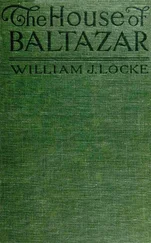William Locke - The Joyous Adventures of Aristide Pujol
Здесь есть возможность читать онлайн «William Locke - The Joyous Adventures of Aristide Pujol» — ознакомительный отрывок электронной книги совершенно бесплатно, а после прочтения отрывка купить полную версию. В некоторых случаях можно слушать аудио, скачать через торрент в формате fb2 и присутствует краткое содержание. Жанр: foreign_language, Прочие приключения, foreign_prose, на английском языке. Описание произведения, (предисловие) а так же отзывы посетителей доступны на портале библиотеки ЛибКат.
- Название:The Joyous Adventures of Aristide Pujol
- Автор:
- Жанр:
- Год:неизвестен
- ISBN:нет данных
- Рейтинг книги:3 / 5. Голосов: 1
-
Избранное:Добавить в избранное
- Отзывы:
-
Ваша оценка:
- 60
- 1
- 2
- 3
- 4
- 5
The Joyous Adventures of Aristide Pujol: краткое содержание, описание и аннотация
Предлагаем к чтению аннотацию, описание, краткое содержание или предисловие (зависит от того, что написал сам автор книги «The Joyous Adventures of Aristide Pujol»). Если вы не нашли необходимую информацию о книге — напишите в комментариях, мы постараемся отыскать её.
The Joyous Adventures of Aristide Pujol — читать онлайн ознакомительный отрывок
Ниже представлен текст книги, разбитый по страницам. Система сохранения места последней прочитанной страницы, позволяет с удобством читать онлайн бесплатно книгу «The Joyous Adventures of Aristide Pujol», без необходимости каждый раз заново искать на чём Вы остановились. Поставьте закладку, и сможете в любой момент перейти на страницу, на которой закончили чтение.
Интервал:
Закладка:
“ Qu’est-ce qu’il y a? ”
Aristide paused in his demonstrations of merriment. “Monsieur,” said he, “I have just discovered what I am going to do to M. Bondon.”
Delight bubbled out of him as he walked from the Avignon Railway Station up the Cours de la République. The wretch Bondon lay at his mercy. He had not proceeded far, however, when his quick eye caught sight of an object in the ramshackle display of a curiosity dealer’s. He paused in front of the window, fascinated. He rubbed his eyes.
“No,” said he; “it is not a dream. The bon Dieu is on my side.”
He went into the shop and bought the object. It was a pair of handcuffs.
At a little after three o’clock the small and dilapidated hotel omnibus drove up before the Hôtel de la Curatterie, and from it descended Aristide Pujol, radiant-eyed, and a scrubby little man with a goatee beard, pince-nez, and a dome-like forehead, who, pale and trembling, seemed stricken with a great fear. It was Bondon. Together they entered the little hall. As soon as Bocardon saw his enemy his eyes blazed with fury, and, uttering an inarticulate roar, he rushed out of the bureau with clenched fists murderously uplifted. The terrified Bondon shrank into a corner, protected by Aristide, who, smiling like an angel of peace, intercepted the onslaught of the huge man.
“Be calm, my good Bocardon, be calm.”
But Bocardon would not be calm. He found his voice.
“Ah, scoundrel! Miscreant! Wretch! Traitor!” When his vocabulary of vituperation and his breath failed him, he paused and mopped his forehead.
Bondon came a step or two forward.
“I know, monsieur, I have all the wrong on my side. Your anger is justifiable. But I never dreamt of the disastrous effect of my acts. Let me see her, my good M. Bocardon, I beseech you.”
“Let you see her?” said Bocardon, growing purple in the face.
At this moment Zette came running up the passage.
“What is all this noise about?”
“Ah, madame!” cried Bondon, eagerly, “I am heart-broken. You who are so kind – let me see her.”
“ Hein ?” exclaimed Bocardon, in stupefaction.
“See whom?” asked Zette.
“My dear dead one. My dear Euphémie, who has committed suicide.”
“But he’s mad!” shouted Bocardon, in his great voice. “Euphémie! Euphémie! Come here!”
At the sight of Euphémie, pale and shivering with apprehension, Bondon sank upon a bench by the wall. He stared at her as if she were a ghost.
“I don’t understand,” he murmured, faintly, looking like a trapped hare at Aristide Pujol, who, debonair, hands on hips, stood a little way apart.
“Nor I, either,” cried Bocardon.
A great light dawned on Zette’s beautiful face. “I do understand.” She exchanged glances with Aristide. He came forward.
“It’s very simple,” said he, taking the stage with childlike exultation. “I go to find Bondon this morning to kill him. In the train I have a sudden inspiration, a revelation from Heaven. It is not Zette but Euphémie that is the bonne amie of Bondon. I laugh, and frighten a long-toothed English old maid out of her wits. Shall I get out at Tarascon and return to Nîmes and tell you, or shall I go on? I decide to go on. I make my plan. Ah, but when I make a plan, it’s all in a second, a flash, pfuit! At Avignon I see a pair of handcuffs. I buy them. I spend hours tracking that animal there. At last I find him at the station about to start for Lyon. I tell him I am a police agent. I let him see the handcuffs, which convince him. I tell him Euphémie, in consequence of the discovery of his letter, has committed suicide. There is a procès-verbal at which he is wanted. I summon him to accompany me in the name of the law – and there he is.”
“Then that letter was not for my wife?” said Bocardon, who was not quick-witted.
“But, no, imbecile!” cried Aristide.
Bocardon hugged his wife in his vast embrace. The tears ran down his cheeks.
“Ah, my little Zette, my little Zette, will you ever pardon me?”
“ Oui, je te pardonne, gros jaloux ,” said Zette.
“And you!” shouted Bocardon, falling on Aristide; “I must embrace you also.” He kissed him on both cheeks, in his expansive way, and thrust him towards Zette.
“You can also kiss my wife. It is I, Bocardon, who command it.”
The fire of a not ignoble pride raced through Aristide’s veins. He was a hero. He knew it. It was a moment worth living.
The embraces and other expressions of joy and gratitude being temporarily suspended, attention was turned to the unheroic couple who up to then had said not one word to each other. The explanation of their conduct, too, was simple, apparently. They were in love. She had no dowry. He could not marry her, as his parents would not give their consent. She, for her part, was frightened to death by the discovery of the letter, lest Bocardon should turn her out of the house.
“What dowry will satisfy your parents?”
“Nothing less than twelve thousand francs.”
“I give it,” said Bocardon, reckless in his newly-found happiness. “Marry her.”
The clock in the bureau struck four. Aristide pulled out his watch.
“ Saperlipopette! ” he cried, and disappeared like a flash into the street.
“But what’s the matter with him?” shouted Bocardon, in amazement.
Zette went to the door. “He’s running as if he had the devil at his heels.”
“Was he always like that?” asked her husband.
“How always?”
“ Parbleu! When you used to see him at your Aunt Léonie’s.”
Zette flushed red. To repudiate the saviour of her entire family were an act of treachery too black for her ingenuous heart.
“Ah, yes,” she replied, calmly, coming back into the hall. “We used to call him Cousin Quicksilver.”
In the big avenue Aristide hailed a passing cab.
“To the Hôtel du Luxembourg – at a gallop!”
In the joyous excitement of the past few hours this child of impulse and sunshine, this dragon-fly of a man, had entirely forgotten the appointment at two o’clock with the American millionaire and the fortune that depended on it. He would be angry at being kept waiting. Aristide had met Americans before. His swift brain invented an elaborate excuse.
He leaped from the cab and entered the vestibule of the hotel.
“Can I see M. Congleton?” he asked at the bureau.
“An American gentleman? He has gone, monsieur. He left by the three-thirty train. Are you M. Pujol? There is a letter for you.”
With a sinking heart he opened it and read: —
Dear Sir, – I was in this hotel at two o’clock, according to arrangement. As my last train to Japan leaves at three-thirty, I regret I cannot await your convenience. The site of the hotel is satisfactory. Your business methods are not. I am sorry, therefore, not to be able to entertain the matter further. – Faithfully,
William B. Congleton.
He stared at the words for a few paralyzed moments. Then he stuffed the letter into his pocket and broke into a laugh.
“ Zut! ” said he, using the inelegant expletive whereby a Frenchman most adequately expresses his scorn of circumstance. “ Zut! If I have lost a fortune, I have gained two devoted friends, so I am the winner on the day’s work.”
Whereupon he returned gaily to the bosom of the Bocardon family and remained there, its Cousin Quicksilver and its entirely happy and idolized hero, until the indignation of the eminent M. Say summoned him to Paris.
And that is how Aristide Pujol could live thenceforward on nothing at all at Nîmes, whenever it suited him to visit that historic town.
Читать дальшеИнтервал:
Закладка:
Похожие книги на «The Joyous Adventures of Aristide Pujol»
Представляем Вашему вниманию похожие книги на «The Joyous Adventures of Aristide Pujol» списком для выбора. Мы отобрали схожую по названию и смыслу литературу в надежде предоставить читателям больше вариантов отыскать новые, интересные, ещё непрочитанные произведения.
Обсуждение, отзывы о книге «The Joyous Adventures of Aristide Pujol» и просто собственные мнения читателей. Оставьте ваши комментарии, напишите, что Вы думаете о произведении, его смысле или главных героях. Укажите что конкретно понравилось, а что нет, и почему Вы так считаете.












